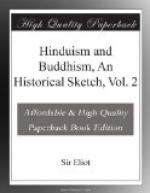The first clear accounts of the worship of Siva and Vishnu are contained in the epics and indicate the existence of sectarian religion, that is to say of exclusive devotion to one or other deity. But there is also a tendency to find a place for both, a tendency which culminates in the composite deity Sankara Narayana already mentioned. Many of the Puranas[457] reflect this view and praise the two deities impartially. The Mahabharata not unfrequently does the same but the general impression left by this poem is that the various parts of which it consists have been composed or revised in a sectarian spirit. The body of the work is a narrative of exploits in which the hero Krishna plays a great part but revised so as to make him appear often as a deity and sometimes as the Supreme Spirit. But much of the didactic matter which has been added, particularly books XII and XIII, breathes an equally distinct Sivaite spirit and in the parts where Krishna is treated as a mere hero, the principal god appears to be not Vishnu but Siva.
The Mahabharata and Puranas contain legends which, though obscure, refer to conflicts of the worshippers of Siva with those who offered Vedic sacrifices as well as with the votaries of Vishnu, and to a subsequent reconciliation and blending of the various cults. Among these is the well-known story of Daksha’s sacrifice to which Siva was not invited. Enraged at the omission he violently breaks up the sacrifice either in person or through a being whom he creates for the purpose, assaults the officiants and the gods who are present, and is pacified by receiving a share. Similarly we hear[458] that he once seized a victim at a sacrifice and that the gods in fear allotted to him the choicest portion of the offerings. These stories indicate that at one time Brahmans did not countenance his worship and he is even represented as saying to his wife that according to rule (dharmatah) he has no share in the sacrifice.[459] Possibly human victims were immolated in his honour, as they were in Kali’s until recently, for in the Mahabharata[460] it is related how Krishna expostulated with Jarasandha who proposed to offer to Siva a sacrifice of captive kings. In the Vishnu-Purana, Krishna fights with Siva and burns Benares. But by the time that the Mahabharata was put together these quarrels were not in an acute stage. In several passages[461] Krishna is made to worship Siva as the Supreme Spirit and in others[462] vice versa Siva celebrates the glory of Krishna. Vishnuites do not disbelieve in Siva but they regard him as a god of this world, whereas their own deity is cosmic and universal. Many Vishnuite works[463] are said to be revealed by Siva who acts as an intermediary between us and higher spheres.
3




